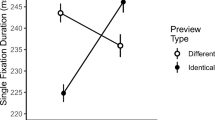Abstract
The purpose of this study was to investigate whether words are processed differently when they are fixated during silent reading than when they are skipped. According to a serial processing model of eye movement control (e.g., EZ Reader) skipped words are fully processed (Reichle, Rayner, Pollatsek, Behavioral and Brain Sciences, 26(04):445–476, 2003), whereas in a parallel processing model (e.g., SWIFT) skipped words do not need to be fully processed (Engbert, Nuthmann, Richter, Kliegl, Psychological Review, 112(4):777–813, 2005). Participants read 34 sentences with target words embedded in them while their eye movements were recorded. All target words were three-letter, low-frequency, and unpredictable nouns. After the reading session, participants completed a repetition priming lexical decision task with the target words from the reading session included as the repetition prime targets, with presentation of those same words during the reading task acting as the prime. When participants skipped a word during the reading session, their reaction times on the lexical decision task were significantly longer (M = 656.42 ms) than when they fixated the word (M = 614.43 ms). This result provides evidence that skipped words are sometimes not processed to the same degree as fixated words during reading.

Similar content being viewed by others
Notes
The control group and the experimental group did not have different baseline reaction times as revealed by an analysis comparing the reaction times on the filler words for each group, β = 10.23, SE = 52.21, t = 0.20, p = 0.88. The fact that there were no baseline differences allows us to directly attribute any differences in reaction times to exposure to the word (skip, fixate, or no exposure control).
Our cloze task norms revealed that no words (not just our target words) were predictable in the sentence contexts, with the highest cloze task probability at 15% for any one response.
References
Baayen, R. H., Piepenbrock, R., & van Run, H. (1995). The CELEX lexical data base, Release 2 on [CD-ROM]. University of Pennsylvania, Philadelphia: Linguistic Data Consortium.
Choi, W., & Gordon, P. C. (2013). Coordination of word recognition and oculomotor control during reading: The role of implicit lexical decisions. Journal of Experimental Psychology: Human Perception and Performance, 39(4), 1032–1046.
Daneman, M., Lennertz, T., & Hannon, B. (2007). Shallow semantic processing of text: Evidence from eye movements. Language and Cognitive Processes, 22(1), 83–105.
Drieghe, D., Rayner, K., & Pollatsek, A. (2005). Eye movements and word skipping during reading revisited. Journal of Experimental Psychology: Human Perception and Performance, 31(5), 954–969.
Engbert, R., Nuthmann, A., Richter, E. M., & Kliegl, R. (2005). SWIFT: a dynamical model of saccade generation during reading. Psychological Review, 112(4), 777–813.
Henderson, J. M., & Ferreira, F. (1990). Effects of foveal processing difficulty on the perceptual span in reading: implications for attention and eye movement control. Journal of Experimental Psychology: Learning, Memory, and Cognition, 16(3), 417–429.
Pollatsek, A., Reichle, E. D., & Rayner, K. (2006). Tests of the EZ Reader model: Exploring the interface between cognition and eye-movement control. Cognitive Psychology, 52(1), 1–56.
Rayner, K. (1998). Eye movements in reading and information processing: 20 years of research. Psychological Bulletin, 124(3), 372–422.
Rayner, K., Binder, K. S., Ashby, J., & Pollatsek, A. (2001). Eye movement control in reading: Word predictability has little influence on initial landing positions in words. Vision Research, 41(7), 943–954.
Rayner, K., Juhasz, B. J., & Brown, S. J. (2007). Do readers obtain preview benefit from word n + 2? A test of serial attention shift versus distributed lexical processing models of eye movement control in reading. Journal of Experimental Psychology: Human Perception and Performance, 33(1), 230–245.
Reichle, E. D., Rayner, K., & Pollatsek, A. (2003). The EZ Reader model of eye-movement control in reading: Comparisons to other models. Behavioral and Brain Sciences, 26(04), 445–476.
Scarborough, D. L., Cortese, C., & Scarborough, H. S. (1977). Frequency and repetition effects in lexical memory. Journal of Experimental Psychology: Human Perception and Performance, 3(1), 1–17.
Vitu, F., & McConkie, G. W. (2000). Regressive saccades and word perception in adult reading. Reading as a Perceptual Process, 301–326.
Vitu, F., McConkie, G. W., & Zola, D. (1998). About regressive saccades in reading and their relation to word identification. Eye Guidance in Reading and Scene Perception, 101–124.
Yap, M. J., Balota, D. A., & Tan, S. E. (2013). Additive and interactive effects in semantic priming: Isolating lexical and decision processes in the lexical decision task. Journal of Experimental Psychology: Learning Memory and Cognition, 39(1), 140–158.
Author information
Authors and Affiliations
Corresponding author
Rights and permissions
About this article
Cite this article
Eskenazi, M.A., Folk, J.R. Skipped words and fixated words are processed differently during reading. Psychon Bull Rev 22, 537–542 (2015). https://doi.org/10.3758/s13423-014-0682-6
Published:
Issue Date:
DOI: https://doi.org/10.3758/s13423-014-0682-6




